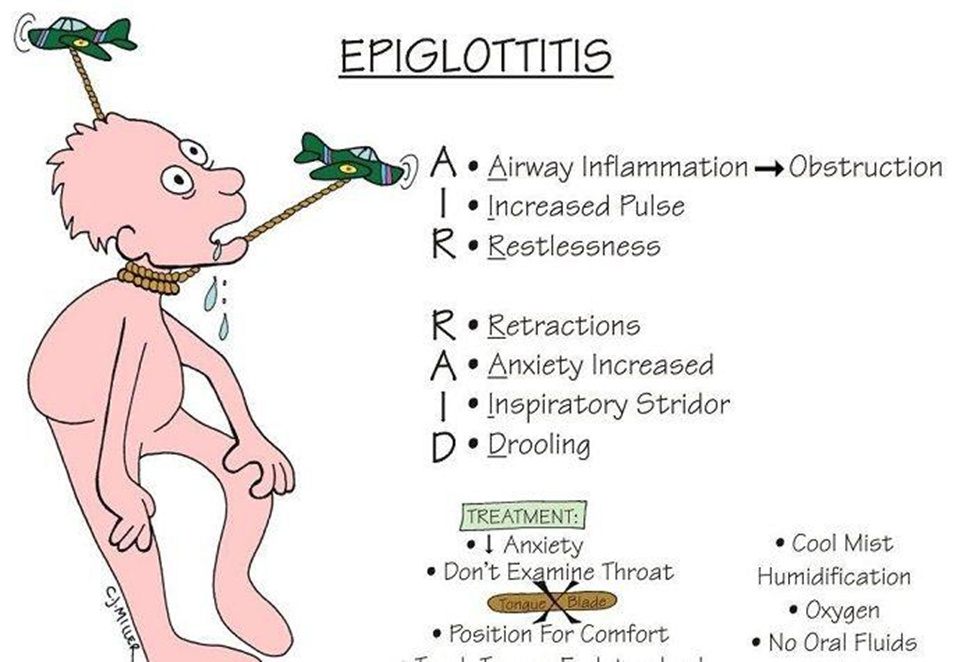The nurse in the emergency department is caring for a child who appears extremely ill with a high fever, unable to control their oral secretions. with voice hoarseness and inspiratory stridor and inspiratory sternal retractions while breathing. The nurse suspects epiglottitis. Which would the nurse do next?
Contact the assigned emergency room physician to evaluate the need for an advanced airway
Administer intravenous corticosteroids
Obtain a throat culture
inspect the throat to obtain further data to support the diagnosis
The Correct Answer is A
A. Contact the assigned emergency room physician to evaluate the need for an advanced airway
Explanation:
Epiglottitis is a medical emergency that can rapidly progress to airway obstruction. The classic signs and symptoms include a high fever, difficulty swallowing, voice hoarseness, inspiratory stridor, and sternal retractions. Immediate intervention may be necessary to secure the airway. Therefore, contacting the emergency room physician to evaluate the need for an advanced airway (such as intubation) is a priority.
B. Administer intravenous corticosteroids
Explanation: While corticosteroids may be used in the management of epiglottitis to reduce airway inflammation, securing the airway is the priority in the acute phase. Corticosteroids would typically be administered after securing the airway.
C. Obtain a throat culture
Explanation: Obtaining a throat culture is not the immediate priority in the case of suspected epiglottitis. Prompt intervention to secure the airway takes precedence over diagnostic tests.
D. Inspect the throat to obtain further data to support the diagnosis
Explanation: Direct visualization of the throat (inspection) may exacerbate the airway obstruction and is not recommended in the acute management of suspected epiglottitis. The priority is to secure the airway while minimizing agitation and discomfort for the child. Diagnostic procedures, such as obtaining a throat culture, can be considered after the airway is stabilized.

Nursing Test Bank
Naxlex Comprehensive Predictor Exams
Related Questions
Correct Answer is D
Explanation
A. When a parent is holding the infant
Explanation: Being held by a parent is generally a comforting and calming experience for an infant, and it is unlikely to significantly increase oxygen demand. In fact, the presence of a familiar caregiver may help reduce stress.
B. During sleep
Explanation: During sleep, an infant's oxygen demand may decrease, and oxygen supplementation may not be necessary unless there are specific indications or concerns about oxygen saturation levels.
C. When changing the infant's diapers
Explanation: Changing a diaper is a routine care activity that is not likely to significantly increase oxygen demand. It is not typically associated with stress or increased metabolic activity that would necessitate additional oxygen.
D. When drawing blood for electrolyte level testing
Explanation:
Drawing blood for electrolyte level testing is a potentially stressful procedure that may cause distress and anxiety in the infant. Stress and anxiety can increase the metabolic rate and oxygen demand. In a situation where an infant is already prescribed oxygen as needed for heart failure, additional stressors like blood drawing may necessitate the administration of oxygen to ensure an adequate oxygen supply
Correct Answer is C
Explanation
A. 9 months: By 9 months, most infants would have well exceeded doubling their birth weight.
B. 12 months: Doubling of birth weight usually occurs earlier, by around 5 to 6 months, rather than 12 months.
C. 6 months
Explanation:
The general guideline is that infants tend to double their birth weight by around 5 to 6 months of age. This doubling of birth weight is a common marker of healthy growth and development during the first few months of life.
D. 3 months: By 3 months, while infants experience significant growth, they usually haven't doubled their birth weight yet.
Whether you are a student looking to ace your exams or a practicing nurse seeking to enhance your expertise , our nursing education contents will empower you with the confidence and competence to make a difference in the lives of patients and become a respected leader in the healthcare field.
Visit Naxlex, invest in your future and unlock endless possibilities with our unparalleled nursing education contents today
Report Wrong Answer on the Current Question
Do you disagree with the answer? If yes, what is your expected answer? Explain.
Kindly be descriptive with the issue you are facing.
